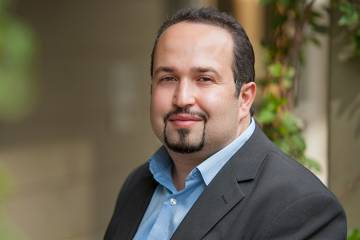When counseling students about their career aspirations, Farouk Dey recommends asking the question, What inspires you? rather than, What do you want to do? The former, he believes, can spark a conversation about a student's interests and values, whereas the latter may suggest an immovable target. Successful careers, he believes, rarely unfold that way.
Dey, vice provost for integrative learning and life design at Johns Hopkins, discussed his approach to career development Thursday during a retreat for PhD program directors focused on preparing PhD students for nonacademic careers. In a keynote address, Dey spoke about life design, a career-planning process that uses components of "design thinking" to make career choices. In engineering, for example, designers don't begin with the end goal in mind. Instead, he said, they consider their various needs and allow the process of prototyping and experimentation to lead the way. Dey believes career development should follow a similar process.
"Most of the time, when I ask people who are happy in their careers how they got there, they say it was by accident," Dey said. "And what they mean by that is they were in the right place at the right time, and they had a moment of inspiration that allowed them to make an audacious move or pivot in their career. And that's what we should encourage for our students."
During the retreat, more than 75 Johns Hopkins PhD program directors from all PhD-granting university divisions shared methods for integrating career development into doctoral program curricula. The majority of the retreat was spent discussing successful efforts that already are being implemented across the university and brainstorming additional ideas that programs could pursue.
During panel discussions and short presentations, faculty and staff discussed courses, seminars, and speaker series that already exist in certain programs or offices that highlight pathways to nonacademic careers, such as Teaching Academy, a universitywide program that provides educational and career training to graduate students and postdoctoral fellows; the Student Career Development Team in the Homewood Career Center, which provides a grant to support student groups as they organize career development programs; and an initiative in the Department of History that aims to provide all PhD students with career placement information.
Small group discussions generated a variety of strategies for preparing students for the workforce, including:
- Empowering students to participate in developing career-focused programming and providing stipends to fund programs designed by individual departments
- Cultivating a strong network of university alumni who can speak with current students about their career paths and provide guidance and insight
- Encouraging faculty members, as key points of contact for students, to take part in career planning discussions and to coordinate programs with career center staff
Speakers at the retreat highlighted the importance of including career planning in PhD curricula, and doing so early on. Assistant Professor Lieny Jeon presented a yearlong class for PhD students in the School of Education called Career Development and Academic Writing. She discussed how the course helps introduce students to career paths they might not have considered.
"Sometimes, students know they don't want to go into academia, but they don't know what other options they have," she said.
Peter Espenshade, associate dean for graduate biomedical education at the School of Medicine, discussed the university's OPTIONS curriculum for graduate students and postdoctoral trainees in the schools of Medicine, Nursing, and Public Health. The program provides opportunities for career exploration, in-depth training, and job preparedness. Espenshade recommended all biomedical students have the opportunity to take part in such a program.
"Students know that they're not all going to end up in a tenure-track academic position," he said. "They want to know that, as a graduate program, you're going to offer them some form of structure to help them through their training, learn what they're interested in, and provide the skills they need to enter into these different careers."
Lainie Rutkow, a professor in Health Policy and Management in the Bloomberg School of Public Health, emphasized that creating an alumni panel discussion can be a relatively low-effort way of exposing current students to a range of careers that graduates have pursued and providing students the opportunity to network with these alumni.
Retreat organizers, led by Nancy Kass, vice provost for graduate and professional education, aimed to bring together PhD program directors from around the university to work toward shared goals of increasing student access to career development and raising awareness of nonacademic careers.
"The numbers vary by discipline, but fewer than 50 percent of our students enter academic careers, and that includes tenure-track jobs, postdoctoral positions, and other university-based positions combined," Kass said. "We need to continue to prepare students, as we always have, to be outstanding professionals in their disciplines, but we also need to be mindful about what the job market looks like for them and ensure that we are preparing them to enter a range of relevant careers."
Kass also announced during the retreat that the President's Office and the Provost's Office will sponsor two competitions this fall to further the goals of increasing nonacademic career preparedness in PhD programs. Funding will be awarded for single or small-scale events in individual programs and for longer, more immersive experiences for students such as internships and workshops.
"The faculty who advise PhD students are poised to have the greatest impact on how students approach their thinking about their future careers," Provost Sunil Kumar said in a written statement. "While we can't expect all faculty in all programs to advise on any and every career their PhD students might pursue, we do expect them to engage enthusiastically in these discussions and to signal, as leaders in their fields, that our graduates can, will, and should use their training to make contributions in the world in any number of ways."
Posted in University News
Tagged phd, graduate education, careers








